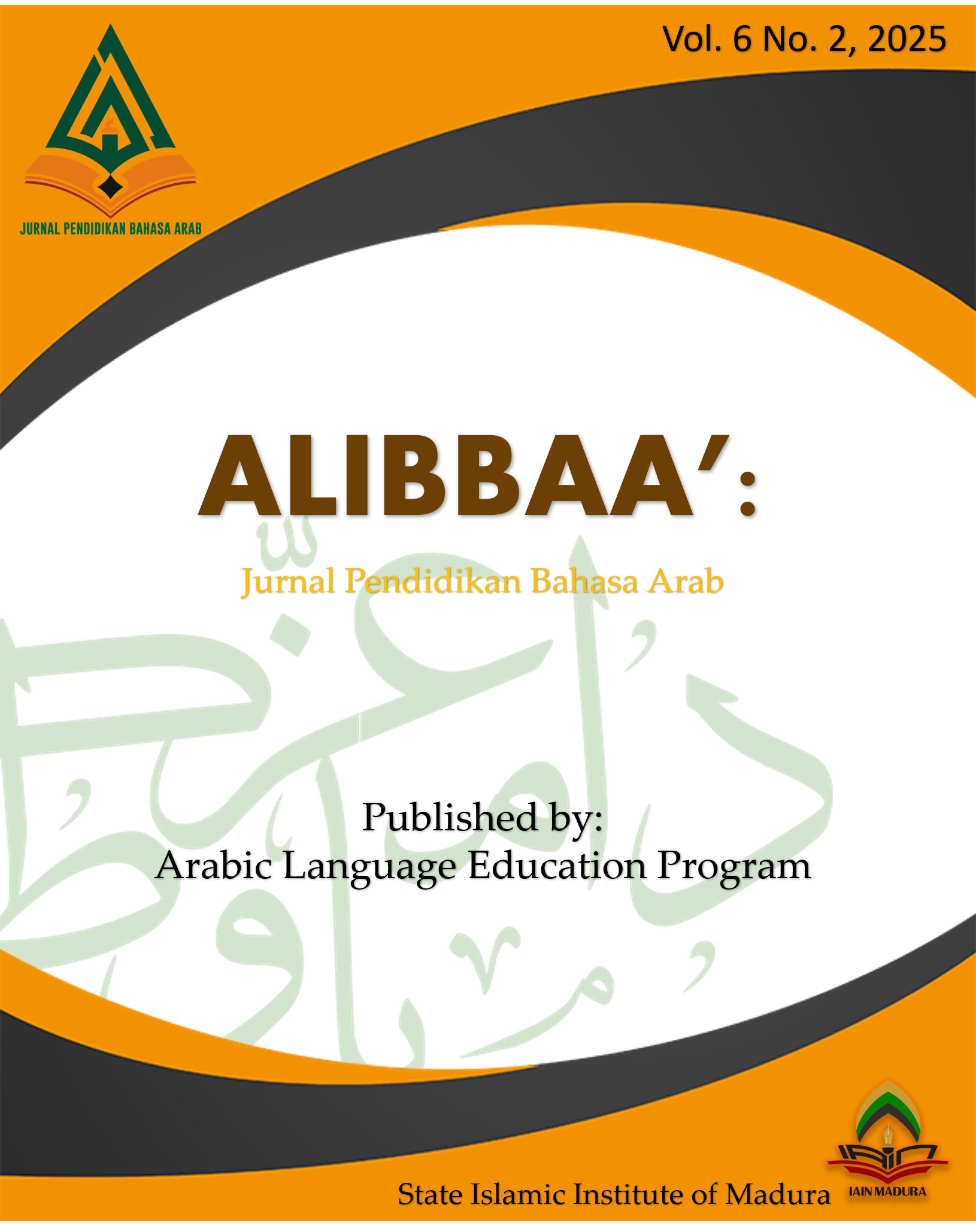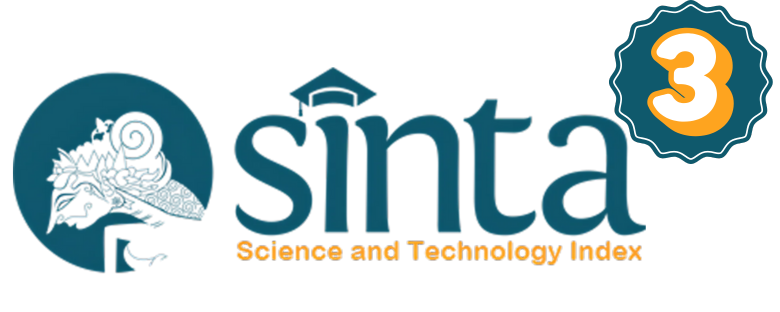Cultivating Metacognitive Awareness through Self-Assessment: An Instrument for Evaluating Four Language Skills in Arabic Learning
 Abstract views: 238
,
Abstract views: 238
,
 pdf downloads: 168
pdf downloads: 168
Abstract
Affective domain assessment in Arabic language learning is still rarely done systematically due to time constraints and teacher confusion over assessment indicators. As a result, students are less involved in reflective processes that support learning awareness and self-regulation. This study aims to develop a self-assessment instrument on the four Arabic language skills (listening, speaking, reading, and writing), which also train students' metacognitive abilities. The research method employed is the Borg and Gall development steps by adapting them into four steps: Research and information collecting, planning, product development, and validity test. This research produces a self-assessment instrument that combines the Arabic textbook of the Ministry of Religious Affairs (2020) and the competency standards of KMA 183 (2019) for the four Arabic language skills. The self-assessment instrument contains: 1) title; 2) instructions for filling; 3) student identity; 4) theme and basic competencies that must be achieved; and 5) self-assessment questionnaire. The validation results from the three validators indicated that the self-assessment instrument was valid and appropriate for use in assessing students’ proficiency in Arabic language learning.
Downloads
References
Abdullah, Iis Susiawati, and Dadan Mardani Samsudin. “Learning Arabic Language Skills for Adults (Jack C. Richard Thought Review).” Alibbaa’: Jurnal Pendidikan Bahasa Arab 3, no. 2 (July 31, 2022): 103–23. https://doi.org/10.19105/ajpba.v3i2.5924.
Ainin, Moh. Penilaian Berpikir Tingkat Tinggi (HOTS) Dalam Pembelajaran Bahasa Arab. Edited by Tim CV. Bintang Sejahtera. 1st ed. Malang: CV. Bintang Sejahtera, 2023.
Annida Zulfa, Hamsi Mansur, Monry Fraick Nicky Gillian Ratumbuysang, Martine Warren, and Terry Harris. “Developing an Innovative Board Game Using a Cooperative Learning Approach to Foster Interest in Learning Arabic.” Alibbaa’: Jurnal Pendidikan Bahasa Arab 6, no. 1 (January 30, 2025): 99–119. https://doi.org/10.19105/ajpba.v6i1.17834.
Annova, Fauzana, and Rehani. “Konsep Pengembangan Bahan Ajar Bahasa Arab Bagi Peserta Didik Di Indonesia.” Alibbaa’: Jurnal Pendidikan Bahasa Arab 3, no. 2 (August 18, 2022): 141–61. https://doi.org/10.19105/ajpba.v3i2.6228.
Artanti, Reni Ratih, and Tri Rijanto. “Kemampuan Komunikasi, Kolaborasi, Metakognisi, Dan Hasil Belajar Mata Pelajaran Operasi Teknik Kimia.” Jurnal Pendidikan Madrasah 9, no. 2 (November 30, 2024): 237–44. https://doi.org/10.14421/jpm.2024.237-244.
Asrori, Imam, Muhammad Thohir, and Moh. Ainin. Evaluasi Pembelajaran Bahasa Arab. 4th ed. Malang: Misykat Indonesia, 2020.
Atikah, Ayu. “Efektivitas Instrumen Asesmen Afektif Dalam Meningkatkan Kualitas Pembelajaran Bahasa Indonesia.” Perspektif : Jurnal Pendidikan Dan Ilmu Bahasa 2, no. 3 (July 9, 2024): 40–48. https://doi.org/10.59059/perspektif.v2i3.1451.
Bakiko, Ihor, Tetiana Krutsevich, and Sergii Trachuk. “Effect of Physical Development Self-Assessment Indicators on Value Orientation Structure Formation in Senior School Age Students.” Physical Education Theory and Methodology 22, no. 2 (June 25, 2022): 151–57. https://doi.org/10.17309/tmfv.2022.2.01.
Butler, Yuko Goto. “Self-Assessment in Second Language Learning.” Language Teaching 57, no. 1 (January 9, 2024): 42–56. https://doi.org/10.1017/S0261444822000489.
Dadang Firdaus, Moh. Ainin, Muashomah, and Husnatul Hamidiyyah Siregar. “Menakar Al Maharah Al Lughawiyah Dalam KMA 183 Dengan Standar ACTFL.” Shaut Al Arabiyyah 11, no. 1 (July 25, 2023): 1–18. https://doi.org/10.24252/saa.v11i1.29255.
Dahlan, Syarifuddin. “Self-Assessment Based Counseling: A Further Study Planning Service in High School.” International Journal of Instruction 14, no. 1 (January 1, 2021): 411–26. https://doi.org/10.29333/iji.2021.14124a.
Fitriyani, Nur, Rinaldi Supriadi, Kristie Agustika Putri, Yayan Nurbayan, and Kasver Mathiessen. “The Application of the Loud Reading Strategy (Al Qira’ah Al Jahriyyah) Based on Pop-Up Books in Enhancing Arabic Reading Skills.” Alibbaa’: Jurnal Pendidikan Bahasa Arab 6, no. 1 (January 10, 2025): 23–41. https://doi.org/10.19105/ajpba.v6i1.15978.
Harahap, Layli Putri Arfianti, Yuli Mulyawati, and Elly Sukmanasa. “The Effect of Applying the Mentimeter Media Assisted Problem Based Learning Model on Mathematics Learning Outcomes in Data Presentation Materials.” International Research-Based Education Journal 5, no. 1 (2023): 128–39. http://journal2.um.ac.id/index.php/irbej/article/view/30907.
Kaukab, M Elfan. “PENILAIAN AUTENTIK DALAM PEMBELAJARAN BAHASA ARAB.” NIVEDANA : Jurnal Komunikasi Dan Bahasa 2, no. 1 (August 10, 2021): 60–75. https://doi.org/10.53565/nivedana.v2i1.282.
Kosim, Nanang, Ade Arip Ardiansyah, Hilda Saripatul Hikmah, and Yusuf Ali Shaleh Atha. “The Use of The Task-Base Language Teaching (TBLT) Method to Improve Learning Outcomes of Arabic Language Skills.” Alibbaa’: Jurnal Pendidikan Bahasa Arab 5, no. 2 (July 31, 2024): 144–65. https://doi.org/10.19105/ajpba.v5i2.14804.
Krismony, Ni Putu Aprilia, Desak Putu Parmiti, and I Gusti Ngurah Japa. “Pengembangan Instrumen Penilaian Untuk Mengukur Motivasi Belajar Siswa SD.” Jurnal Ilmiah Pendidikan Profesi Guru 3, no. 2 (September 4, 2020): 249. https://doi.org/10.23887/jippg.v3i2.28264.
Kuo, Yen-Ku, Sadia Batool, Sheila Devi, Tehseen Tahir, and Jiawen Yu. “Exploring the Impact of Emotionalized Learning Experiences on the Affective Domain: A Comprehensive Analysis.” Heliyon 10, no. 1 (January 2024): e23263. https://doi.org/10.1016/j.heliyon.2023.e23263.
Magdalena, Ina. Evaluasi Pembelajaran Sekolah Dasar. Edited by Resa Awahita. 1st ed. Sukabumi: CV Jejak, anggota IKAPI, 2023. https://books.google.co.id/books?hl=id&lr=&id=C3nrEAAAQBAJ&oi=fnd&pg=PP1&dq=evaluasi+pembelajaran+dalam+ketiga+ranah&ots=lxw8T8Z3OV&sig=vBKVvXliSHMwtobbHc0kpwyxHlI&redir_esc=y#v=onepage&q=evaluasi pembelajaran dalam ketiga ranah&f=false.
Mäkipää, Toni. “Students’ and Teachers’ Perceptions of Self-Assessment and Teacher Feedback in Foreign Language Teaching in General Upper Secondary Education – A Case Study in Finland.” Edited by Sammy King Fai. Cogent Education 8, no. 1 (January 1, 2021). https://doi.org/10.1080/2331186X.2021.1978622.
Mardapi, Djemari, and Ari Setiawan. Penilaian Afektif. 1st ed. Yogyakarta: Parama Publishing, 2018.
Masduqi, Harits, and Fatimah. “Assessment in Indonesian Higher Education: Developing a Reading Comprehension Test for English Students.” International Research-Based Education Journal 4, no. 1 (2022): 1–13. https://doi.org/10.17977.
Munip, Abdul. Penilaian Pembelajaran Bahasa Arab. 1st ed. Yogyakarta: Fakultas Ilmu Tarbiyah dan Keguruan UIN Sunan Kalijaga Yogyakarta, 2017.
Qasem, Fawaz Ali Ahmed. “The Effective Role of Learners’ Self-Assessment Tasks in Enhancing Learning English as a Second Language.” Arab World English Journal 11, no. 3 (September 15, 2020): 502–14. https://doi.org/10.24093/awej/vol11no3.33.
Samsudin, Aji, Gema Fitriady, Arief Darmawan, and Oni Bagus Januarto. “Pengembangan Instrumen Penilaian Diri Dan Sejawat Secara Online Pada Materi Keterampilan Pukulan Lob Bulutangkis Mata Pelajaran PJOK Di SMPN 21 Malang.” Sport Science and Health 5, no. 2 (February 28, 2023): 148–57. https://doi.org/10.17977/um062v5i22023p148-157.
Sani, Ridwan Abdullah. Penilaian Autentik. Edited by Riza Dwi Aningtyas. Jakarta: Bumi Aksara, 2022.
Sibuea, Bismar, Suriyadi Suriyadi, Fakhruddin Azmi, and Nurika Khalila Daulay. “Penilaian Diri Dan Penilaian Reflektif.” Jurnal Ilmiah Universitas Batanghari Jambi 23, no. 2 (July 26, 2023): 1376. https://doi.org/10.33087/jiubj.v23i2.3440.
Siregar, Renol Aprico, Nenden Sri Lengkanawati, and Ika Lestari Damayanti. “METACOGNITIVE STRATEGIES IN MEDIATING EFL ADULT LEARNERS’ SELF-REGULATED LANGUAGE LEARNING: A SYSTEMATIC REVIEW.” LLT Journal: A Journal on Language and Language Teaching 27, no. 1 (April 16, 2024): 252–72. https://doi.org/10.24071/llt.v27i1.5502.
Sri Hastuti, Nurzanah, Samsun Samsun, Indah Mustika Rini, Awaluddin Tjalla, and Lussy Dwi Utami. “Instrumen Penilaian Diri Sebagai Salah Satu Penilaian Dimensi Gotong Royong Peserta Didik Pada Pelaksanaan Projek Penguatan Profil Pelajar Pancasila.” Syntax Idea 6, no. 2 (February 10, 2024): 569–76. https://doi.org/10.46799/syntax-idea.v6i2.2960.
Sugiyono. Metode Penelitian & Pengembangan. 4th ed. Bandung: Alfabeta, 2019. https://opac.perpusnas.go.id/DetailOpac.aspx?id=1326614.
Sumarni, Sri, Vernanda Atik Dewi Sasanti, and Ida Nugroho Saputro. “Developing Creativity Assessment Instruments for Building Engineering Vocational High School Students Based on Self-Assessment in Creative and Entrepreneurial Product Subjects.” Qubahan Academic Journal 5, no. 1 (March 3, 2025): 461–75. https://doi.org/10.48161/qaj.v5n1a1389.
Thatcher, Diana L., Cinzia Cervato, and Charles Kerton. “The Importance of Affective Learning Goals: Lessons Learned from the Design and Evolution of a Geoscience Course for Preservice Primary Teachers.” SN Social Sciences 2, no. 10 (September 23, 2022): 207. https://doi.org/10.1007/s43545-022-00477-7.
Uno, Hamzah B. Teori Motivasi & Pengukurannya Analisis Di Bidang Pendidikan. Jakarta: Bumi Aksara, 2016.
Wolsey, Thomas Devere. “Self‐Assessment in Reading.” In The TESOL Encyclopedia of English Language Teaching, 1–8. Wiley, 2020. https://doi.org/10.1002/9781118784235.eelt0497.
Yan, Zi, Ming Ming Chiu, and Po Yuk Ko. “Effects of Self-Assessment Diaries on Academic Achievement, Self-Regulation, and Motivation.” Assessment in Education: Principles, Policy & Practice 27, no. 5 (September 2, 2020): 562–83. https://doi.org/10.1080/0969594X.2020.1827221.
Yang, Albert C.M., Irene Y.L. Chen, Brendan Flanagan, and Hiroaki Ogata. “How Students’ Self-Assessment Behavior Affects Their Online Learning Performance.” Computers and Education: Artificial Intelligence 3 (2022): 100058. https://doi.org/10.1016/j.caeai.2022.100058.
Zaeni, Ahmad, Wardani Rahayu, and Makmuri Makmuri. “PENGEMBANGAN INSTRUMEN SELF ASSESSMENT TECHNOLOGICAL PEDAGOGICAL CONTENT KNOWLEDGE (TPACK) CALON GURU MATEMATIKA BERBASIS HOTs.” Teorema: Teori Dan Riset Matematika 6, no. 1 (March 20, 2021): 59. https://doi.org/10.25157/teorema.v6i1.4960.
Authors who publish with this journal agree to the following terms:
a. Authors retain copyright and grant the journal right of first publication with the work simultaneously licensed under a Creative Commons Attribution License that allows others to share the work with an acknowledgement of the work's authorship and initial publication in this journal.
b. Authors are able to enter into separate, additional contractual arrangements for the non-exclusive distribution of the journal's published version of the work (e.g., post it to an institutional repository or publish it in a book), with an acknowledgement of its initial publication in this journal.
c. Authors are permitted and encouraged to post their work online (e.g., in institutional repositories or on their website) prior to and during the submission process, as it can lead to productive exchanges, as well as earlier and greater citation of published work (See The Effect of Open Access).
Alibbaa': Jurnal Pendidikan Bahasa Arab have CC-BY-SA or an equivalent license as the optimal license for the publication, distribution, use, and reuse of scholarly work.
In developing strategy and setting priorities, Alibbaa': Jurnal Pendidikan Bahasa Arab recognize that free access is better than priced access, libre access is better than free access, and libre under CC-BY-SA or the equivalent is better than libre under more restrictive open licenses. We should achieve what we can when we can. We should not delay achieving free in order to achieve libre, and we should not stop with free when we can achieve libre.

Alibbaa': Jurnal Pendidikan Bahasa Arab is licensed under a Creative Commons Attribution 4.0 International License
You are free to:
- Share — copy and redistribute the material in any medium or format
- Adapt — remix, transform, and build upon the material for any purpose, even commercially.
- The licensor cannot revoke these freedoms as long as you follow the license terms.











